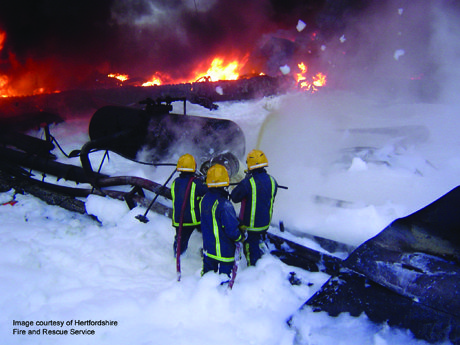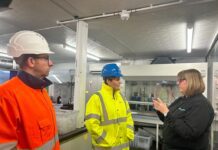
WASTE handling and recycling sites, currently under obligation to re-assess their fire accident plans, could be failing to plan for the impact of millions of litres of water likely to be discharged to fight a major fire, experts have recently warned.
Last year the Environment Agency issued revised technical guidance for sites storing combustible waste instructing them to review their fire accident planning with a ‘must’ action to meet the standards. The clampdown followed a string of high-profile fires at waste handling premises.
Water pollution experts are warning operators to be sure to review whether their sites are able to safely contain the huge volumes of firewater likely to be needed to control a waste fire. Not only could some sites be unknowingly in danger of causing serious environmental damage through fire water pollution, but could also be at risk of incurring crippling costs in fines and cleanup charges.

“The most likely environmental damage caused by fire at a waste handling site is not a result of the fire itself, but the water that is used to fight it,” explains David Cole, Water Pollution Manager at Hydro International. “In the early stages of a fire, thousands of litres of water are discharged into the environment every minute. The surface water runoff created will pick up the pollutants and contaminants of whatever burning or hazardous substances are present, and if a site is not fully contained, they will escape into the local environment. Waste handling and recycling centres are among the most vulnerable, and major fires can burn for days or weeks.”
The Environment Agency issued a new industry Technical Guidance Note in March 2015 for sites storing combustible waste. In a short, final paragraph of the guidance, a requirement is included for sites to demonstrate the containment facilities and pollution equipment in place for managing fire water. For this, operators are referred to another recently-revised industry guidance document, CIRIA C736 – Containment Systems for the Prevention of Pollution, for which David Cole acted as an advisor.
During 2014 the Environment Agency reported 10 serious water pollution incidents involving waste management activities, five of which were caused by fires and three by containment and control failures. As government funding is cut back, the environmental authorities have fewer resources to act in an advisory role. So, the first a company may know they do not have adequate provision is when the worst happens, and they face a prosecution, Cole warns.
“Surface water has a habit of finding routes to run off a site in directions no-one had ever expected, before ending up in a river or sewer. Fitting properly designed containment valves is critical, but often I see sites where penstock valves are incorrectly installed. Not all penstocks have the ability to drop seal low pressure flows fully; if a site is looking to contain pollution then the valve must contain the entire flow.
Product development experience
“I have been involved in the development of spill containment technology since 1998. Fitting a high-performance valves such as the recently-launched Hydro-Isolator® valve should guarantee a watertight seal.
“On more complex sites, operators will also still need to be sure that even with valves installed, in the case of a fire incident, the surface water drainage won’t back up, overtop bunds and storage measures and flow out of the site into the surrounding environment.
“New hydraulic modelling techniques can offer waste operators a cost-effective way of mapping pathways on and off a site and identifying any shortfalls before they happen. A containment solution using valves, bunds or other temporary storage can then be designed and tested in the model to ensure it will stand up, even in the worst case scenario.”
David Cole is the inventor of some of the industry’s most commonly-used pollution containment valves and has acted as advisor on key industry guidance. Waste and recycling operators interested in Hydro International’s Hydro-Isolator® valves or the Water Pollution hydraulic modelling and consultancy service can book a free on-site assessment. Call David Cole on 01275 878371 or email dcole@hydro-int.com.







